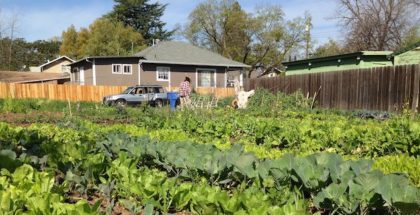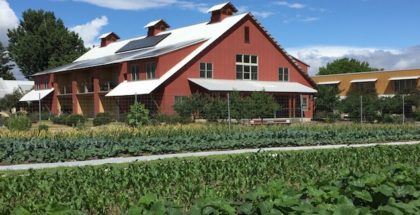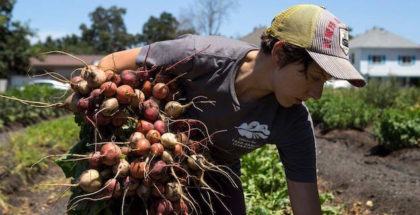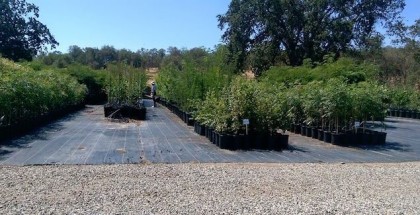Uncategorized
UC Cooperative Extension Offers Urban Farming Workshops in San Diego and Sacramento
March 12, 2018 | seedstockUrban farmers and those considering farming in an urban area are invited to participate in a series of four day-long low-cost workshops offered by University of California Cooperative Extension (UCCE) advisors and other experts in both the San Diego and Sacramento regions. Farmers and potential farmers can take one or take all four of these workshops; each is $20 for a full day of expert speakers, participatory exercises, lunch and refreshments. The workshops will be held at urban farm sites and will include farm tours and discussions with local urban farmers sharing challenges and success stories. The 2018 workshop series starts March 16 in the Sacramento area and March 23 in the San Diego area. Read More
Innovative Neighborhood Farm Adjacent to Housing Complex Increases Food Access and Grows Community
January 16, 2017 | Trish Popovitch“Beyond growing vegetables, beyond growing soil, we’re building community through agriculture,” says Dave Victor of Orchard Gardens Neighborhood Farm and Community Garden. “That’s a big part of the mission, a big part of the vision for the farm. It’s all about providing healthy fresh local food for low income people.”
Dave Victor, after five years honing his growing skills with Garden City Harvest, became the manager of Orchard Gardens Neighborhood Farm just last year and he couldn’t be happier with his new position.
“Just like any sustainable agriculture farmer the focus is on building soil,” says Victor. “I tell people that I’m a vegetable farmer but first and foremost it’s all about growing soil and building that soil ecology.” Read More
Farming Formerly Vacant Lots, Urban Ag Program Grows New Farmers and Fresh Produce for Food Deserts
November 28, 2016 | Bethany Knipp
The West Sacramento Urban Farm Program leases city, school district, private and commercially-owned land for five years in the area’s food desert. Photo courtesy of West Sacramento Urban Farming Program.
An urban farming project in West Sacramento, California, aims to fill the area’s food deserts with fresh produce and create new farmers in the process.
Founded in 2014, the West Sacramento Urban Farm Program is an initiative of the agricultural education nonprofit Center for Land-Based Learning, headquartered in Winters, California. The program converts vacant lots in urban West Sacramento neighborhoods to increase food access, and support production of fresh fruits and vegetables.
“We’re growing about 25,000 to 30,000 pounds of produce a month, so it’s definitely a significant amount of produce that all stays within West Sacramento for the most part,” program founder Sara Bernal says. Read More
Grow Local OC Conference Delves into the Future of Urban Food Systems in Orange County and Beyond
November 15, 2016 | Robert Puro On Nov. 10-11 hundreds of attendees from across Southern California and beyond showed up for the inaugural Grow Local OC Conference: The Future of Urban Food Systems held Nov. 10-11 in Orange County, CA at California State University, Fullerton to learn more about the community and economic development potential of fostering local food systems in cities.
On Nov. 10-11 hundreds of attendees from across Southern California and beyond showed up for the inaugural Grow Local OC Conference: The Future of Urban Food Systems held Nov. 10-11 in Orange County, CA at California State University, Fullerton to learn more about the community and economic development potential of fostering local food systems in cities.
The conference attendees were treated to lectures from the foremost urban farming experts, entrepreneurs, and community advocates in the sustainable and local food system space. Topics explored by the speakers and panelists included the role that food plays in bridging the rural urban divide, Read More
Four Inland Empire Community Garden Programs Working to Make a Difference
June 30, 2016 | AJ Hughes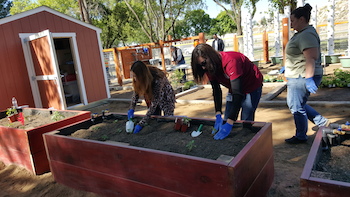
The City of Perris’s Green City Farm. Photo courtesy of the City of Perris.
Community-based agriculture is increasing across the Inland Empire(IE) as more community gardens and the programs related to them are being established. As outlined below, these efforts include many new farm plots where residents are growing their own food, learning new skills and gaining food system awareness. But the people establishing these gardens are going further than just turning bare dirt into growing grounds. They are implementing ancillary programs as well, thereby adding even greater value to their communities. Each of these various enterprises benefits their local cities and neighborhoods by increasing access to healthy and fresh foods, as well as providing employment, educational opportunities and a greater sense of community to everyone involved in their construction, day-to-day upkeep and expansion.
Incredible Edible Community Garden – Upland
A few years ago, Mary Petit and Eleanor Torres decided to tackle the problem of food insecurity in their local Upland area by working at a local community garden. Petit looked for an existing community garden with no success, so she and Torres began their own and named it the Incredible Edible Community Garden. Read More
“Grow Local OC” Conference in Orange County, CA to Examine Future of Urban Food Systems
June 2, 2016 | seedstock (Orange County, CA) – Grow Local OC: The Future of Urban Food Systems, slated for Thursday and Friday, November 10-11, 2016, will explore innovative urban food system developments underway in Orange County and cities across the country that increase the supply of locally grown food in the marketplace, tackle food poverty and access challenges, improve health outcomes, and support entrepreneurship in urban and indoor farming.
(Orange County, CA) – Grow Local OC: The Future of Urban Food Systems, slated for Thursday and Friday, November 10-11, 2016, will explore innovative urban food system developments underway in Orange County and cities across the country that increase the supply of locally grown food in the marketplace, tackle food poverty and access challenges, improve health outcomes, and support entrepreneurship in urban and indoor farming.
On day one of the conference attendees will convene at the Titan Student Union at California State University, Fullerton for a series of panels and keynotes that will explore a variety of topics, including: Innovation and Entrepreneurship in Urban Food Production; Expanding Local Food Access; Building a Regional Food System Infrastructure; The Confluence of Food System and Community Development; and more. Read More
Crowdfunding Tomatoes: Technology Platform Allows Consumers to Fund Produce
May 12, 2016 | Abbie Stutzer
ProduceRun stand. Photo courtesy of ProduceRun.
William Pattison, co-founder and president of ProduceRun, a web-based service that allows farmers to “pre-sell” goods to local consumers via a crowdfunding-like platform, is no stranger to farming. His family has worked the land for four generations.
“ProduceRun started on our own family farm,” Pattison says. “We wanted a better way to be found, sell and distribute our farm products to the public. I feel that our technology can make a real difference for farmers, making it easier for them to do business, and creating easier access for buyers.” Read More
Amidst Changing Economic and Growing Climate Temecula’s Crows Pass Farm Adapts to Survive
April 13, 2016 | AJ Hughes
David and Tina Barnes are co-founders of Crows Pass Farm in Temecula. (photo courtesy Tina Barnes/Crows Pass Farm)
The ability to adapt is a necessary skill for survival in many arenas, especially in farming. David and Tina Barnes of Crows Pass Farm in Temecula, California know this truth from their own experience.
The farm was founded by the Barneses in 1991 and until recently produced a wide variety of crops including lemons, tangerines, oranges, strawberries, spinach and more.
To insure the economic sustainability of their farm, the Barneses initially employed a direct-to-restaurant business model and as recently as 2010, this approach led to success. At that time they were selling food directly to 45 eateries and business was booming.
Citing drought conditions, economic downturns, changing market conditions, an upcoming state minimum wage increase to $15 per hour, and the need to compete against produce growers who sell at a cheaper price, the Barneses made the decision to retrench and change the farm’s business model. Read More

